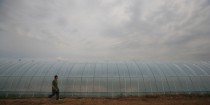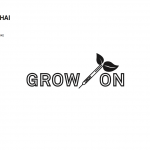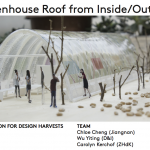published on Chinadialogue on May 30th 2012

A worker walks in front of greenhouses growing organic vegetables in Yanqing district of Beijing.
At a monthly “friends of farming” dinner held by Green Heartland, an NGO based in Chengdu, west China, Chen Xia quietly reads an ode to the land against light background music. It’s a simple thanksgiving ceremony the hosts conduct before leaving the diners to tuck into a feast of organic produce and listen to farmers talk about their lives and land.
Green Heartland was formed by a group of urban residents who buy their food directly from farmers, and their dinners give the two groups a chance to get together. Chen, who is one of the founders, was prompted by health concerns into thinking more seriously about the origins of her food. In 2007, together with two friends, she organised an organic market and heard about a village called Anlong, which was said to be working to protect its land and rivers through sustainable farming. The group started to buy food from the village.
One of her co-founders, Xia Lu, had been working for an NGO in Anlong, but stayed on after her project finished—as a friend, volunteer and consumer. She had plans for a website through which the farmers could reach out to urban consumers, and hoped to arrange customer visits, farmers’ markets and dinners. Her overarching aim was to bring farmers and customers closer together and encourage a return to healthier farming methods. Xia’s ideas got a warm response from people already buying food from Anlong—and Green Heartland was born.
Gradually, the number of customers has grown. Against the backdrop of ever more frequent food safety scares, growing numbers of Chinese citizens are looking for safe and healthy alternatives. The popularity of the organic methods practiced at Anlong is soaring. Zhang Ming, a journalist at local paper Chengdu Daily, became both a customer and Green Heartland member after reporting on the village’s activities.
Some customers have befriended the farmers and help to organise sales and distribute goods. Chen said that the organisation hopes to improve understanding and trust between farmers and the people who eat their produce.
Green Heartland also helps customers link up to make bulk orders and organises markets to boost sales—as well as the farmers’ confidence in the value of organic methods. The group now works with farmers in ten places around Chengdu and has built up a core customer base of more than one hundred people.
This kind of direct participation by consumers in the production of their food is commonly known as Community Supported Agriculture (CSA). It originated in Japan, Europe and the United States and, since 2003, has been actively promoted in China by Hong Kong-based NGO Partnership for Community Development (PCD) and global advocacy group Institute for Agriculture and Trade Policy (IATP).
CSA provides a new way of thinking about food safety, rural economies, environmental damage and urban alienation, as well as creating the possibility of a different way of life. Through local trials, overseas experience and the pressure of food safety scares, CSA has taken root in several Chinese cities as one option for shoppers on the hunt for safer food.
There are many examples. Even before 2003, a group of residents from the city of Liuzhou, south China, were moved to establish Farmers’ Friends following a trip to the countryside where they saw first-hand the threats to traditional agricultural methods and farmers’ struggle for survival. Their social enterprise now takes city dwellers to the countryside to eat at village restaurants and purchase local products.
The meals are delicious and made with produce fresh from the fields. The farmers that the group works with grow rice in their backyards, in the same ponds they use to raise ducks—a traditional organic method. And the seeds they plant are traditional crops handed down from generations past. These ways of working allow the farmers to escape the constraints of commercial agriculture and boost their appeal to customers.
The rise of CSA in China is helping farmers to understand the wider choice organic agriculture can give them, in terms of both technology and markets. It allows them to see that they have options beyond genetically modified crops and industrial farming, which will only relegate them to the bottom rung of a supply chain.
As the number of customers has increased, Farmers’ Friends has opened a museum of traditional farming techniques and a restaurant serving healthy and organic farmhouse fare.
The restaurant, which brings together rural producers and urban consumers, is more about spreading the news and spirit of CSA than serving top cuisine. It works to nurture the traditional crops that are disappearing, provide diversity of income for small-scale farmers, protect farming culture and promote links between city and countryside. The association pays stable prices for produce and has established a fund to help farmers continue to plant traditional crops, organise themselves and promote rural cooperation.
The past three years have seen a surge in cooperation between consumers and farmers outside of commercial markets. All around China, consumers are opening organic shops, holding regular organic markets, setting up collection or sales points and organising bulk purchasing—all activities that bring together consumers and farmers. And, unlike normal markets, consumer advocacy is a big part of what they do. They even arrange for farmers and consumers to negotiate prices together in order to build understanding and trust.
Beijing Farmers’ Market was founded by a small group of consumers in 2010, since when it has expanded to serve an average showing of 2,000 shoppers. Some twenty farmers and farms and more than ten NGOs and craft workshops attend every event. Natural and handmade everyday goods and processed foods are on sale alongside agricultural produce.
The majority of the products on sale are not actually certified as organic, but consumers can talk to the producers about their goods and how they grew them and build up trust in that way. A core group of volunteers pays regular visits to producers to look at their land and talk to them and ensure their products are qualified for the market. The markets started out as a monthly event, but are now held once a week.
Similar activities are flourishing in many other places across China, including Shanghai, Guangdong, Guangxi and Sichuan.
For participants in CSA, “organic” isn’t about certification, but the trust, support and sharing involved in simple business transactions.
And farmers, as well as consumers, are working to build that trust. In Anlong, the organic farmers are even picky about whom they sell their produce to. Gao Yicheng is in charge of deliveries and liaison: “If you want to buy our crops, you need to come here first and have a look around. We won’t give you anything until you’ve actually visited,” he said. The farmers here think it’s crucial that buyers meet producers.
Since 2008, the Shanxi Yongji Farmers’ Association has been working to develop organic agriculture through farmers’ cooperatives. It has attracted plenty of buyers from many places, but is most preoccupied with finding local customers. Zheng Bing, an association official, said that selling locally helps boost trust with consumers.
Supermarkets and big food companies are now pushing “green” and “organic” products. But CSA advocates say that they are in search of something different: nature and health.
At a recent forum on rural development, as experts and NGO representatives were fretting over how organic agriculture could be scaled up, Hebei farmer An Jinlei spoke out: “As a farmer, I don’t like the term ‘organic’. It’s become a buzzword and lost its meaning. The rich folk in the city drive their cars to the supermarket and buy organic food—they’re just worried about their own health. But what are their lifestyles and values, their excessive consumption of resources, doing to the health of the planet?”
An prefers to call his farming methods “natural agriculture”, which he describes as looking after the land in accordance with natural principles. “The land can’t take any more,” he said. “We need to look after it, to help it recuperate. You need the land to be healthy if you are going to get food for a healthy life.”
An believes many modern agricultural ideas go against the laws of nature. That’s what prompted him to quit his job at a state-owned farm ten years ago and return to his home village. Together with his wife, he sought out natural farming methods that would restore the land. He believes that even pests have a place. “If humanity doesn’t stop its exploitation of the land, there’ll be no way back,” he said. His determination has seen once lost birds and insects return. A pharmaceutical firm pays a premium for his cotton and corn, while a number of CSA consumer groups in Beijing buy his crops.
An laments that more farmers in his village aren’t following his example. They generally recognise the harm done by fertilisers and weed-killers, he said, but believe they have no choice because they can’t afford the initial costs of going organic. Without external support, it is almost impossible for farmers suddenly to switch to sustainable farming.
While many farmers cannot afford to go organic, some urban residents have taken matters into their own hands.
Green Mothers Alliance was founded by a group of housewives concerned about their children’s’ health and development. In 2006, food safety scares prompted these women to experiment with growing their own food, but they soon found they lacked the necessary knowledge to make it work. Inspired by CSA outfits like Little Donkey Farm and Taiwan’s Housewives Alliance, they started making bulk purchases from likeminded farmers. Today, their organisation has more than 200 members.
De Run Wu Organic and Natural Store is one of Beijing’s oldest instances of urban residents taking control of their food supply. The owners have a small organic farm outside Beijing, where they grow and sell their products. The shop only sells organic goods, both its own products and those it imports from Taiwan and elsewhere.
Wang Tianxiang of organics products business Ecolourful told chinadialogue that similar operations existed in China as long as twenty or thirty years ago, but were very rare and generally supplied only senior officials and foreigners. Operations with a wider market have only become more common in the past few years. The market is still small, but demand outstrips supply. And prices aren’t high when compared with the costs: half a kilogram of organic vegetables at De Run Wu costs 10 yuan (US$1.60).
Outside of China, CSA got going thanks to concerns over food and land quality. But here, the rise of new approaches to farming has been catalysed by food safety problems. Although most people rely on “organic” labels to make their choices, due to the influence of marketing and the lack of alternatives, more and more shoppers want to know—to really know—where their food is coming from.






Comments by faculty